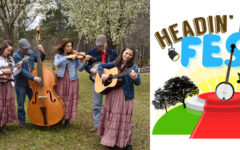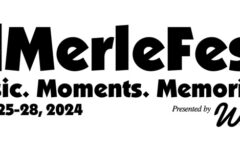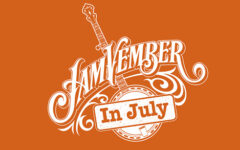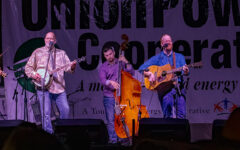This interview with Doyle Lawson at the July 14 edition of Bluegrass Nights at the Ryman was conducted by Nancy Cardwell.
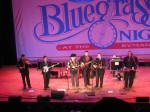 If Bill Monroe, the Father of Bluegrass was looking down from heaven last Thursday night, July 14 at the Ryman Auditorium in Nashville, Tennessee, he would have been tickled. Remember the steely glint in his eyes, the stately white suit and hat, the rhinestone Jesus pin on his lapel, how he cradled his beloved Loar mandolin in his arms and lifted it up gently to the microphone before he proceeded to lay our ears back and break our hearts with a powerful and soulful cascade of notes, how he always carried himself—as Marty Stuart has said, like a “walking statue?”
If Bill Monroe, the Father of Bluegrass was looking down from heaven last Thursday night, July 14 at the Ryman Auditorium in Nashville, Tennessee, he would have been tickled. Remember the steely glint in his eyes, the stately white suit and hat, the rhinestone Jesus pin on his lapel, how he cradled his beloved Loar mandolin in his arms and lifted it up gently to the microphone before he proceeded to lay our ears back and break our hearts with a powerful and soulful cascade of notes, how he always carried himself—as Marty Stuart has said, like a “walking statue?”
Monroe’s music was presented powerfully and his spirit was almost tangible at the celebration of what would have been his 100th birthday year last night. Fans could almost see Monroe sitting with them up in the Confederate Balcony at the Ryman.
 The focus for the evening was rocket fuel-powered bluegrass mandolins, high lonesome leads and vocal harmony, and Bill Monroe stories with striking performances from three generations of mandolin players and singers: Bobby Osborne with his Rocky Top X-Press, Doyle Lawson & Quicksilver, and Sierra Hull and her band Highway 111. The show was emceed and narrated by WSM’s Eddie Stubbs. After sets from the three individual groups, Osborne and Hull joined Lawson and Quicksilver for four Monroe favorites. Fans were thrilled to hear Doyle lead out on Uncle Pen with Bobby Osborne nailing the Monroe tenor line, while fiddlers David Crow and Jason Barie bookended the piece with the old familiar kick-off and the Jenny Lind tag in perfect twin harmony.
The focus for the evening was rocket fuel-powered bluegrass mandolins, high lonesome leads and vocal harmony, and Bill Monroe stories with striking performances from three generations of mandolin players and singers: Bobby Osborne with his Rocky Top X-Press, Doyle Lawson & Quicksilver, and Sierra Hull and her band Highway 111. The show was emceed and narrated by WSM’s Eddie Stubbs. After sets from the three individual groups, Osborne and Hull joined Lawson and Quicksilver for four Monroe favorites. Fans were thrilled to hear Doyle lead out on Uncle Pen with Bobby Osborne nailing the Monroe tenor line, while fiddlers David Crow and Jason Barie bookended the piece with the old familiar kick-off and the Jenny Lind tag in perfect twin harmony.
 A powerful rendition of Monroe’s favorite original song, Blue Moon of Kentucky followed, with Osborne’s scalding, high lead raising the rafters in the old Ryman church house. (It was the original version, where the tempo remains steady and measured throughout the song.) Lawson asked to take the first break on Roanoke so that he wouldn’t have to follow Sierra Hull, and then he pretended to take notes during her break, much to the amusement of the audience. “That little girl is gonna be a terror when she grows up,” he quipped. The evening ended with yet another standing ovation, the audience singing along with Swing Low, Sweet Chariot, another Monroe show favorite.
A powerful rendition of Monroe’s favorite original song, Blue Moon of Kentucky followed, with Osborne’s scalding, high lead raising the rafters in the old Ryman church house. (It was the original version, where the tempo remains steady and measured throughout the song.) Lawson asked to take the first break on Roanoke so that he wouldn’t have to follow Sierra Hull, and then he pretended to take notes during her break, much to the amusement of the audience. “That little girl is gonna be a terror when she grows up,” he quipped. The evening ended with yet another standing ovation, the audience singing along with Swing Low, Sweet Chariot, another Monroe show favorite.
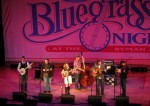 The concert was the fourth in the Springer Mountain Farms Bluegrass Nights at the Ryman series, hosted for the 17th summer in Nashville, Tennessee. Upcoming concerts will feature Dailey & Vincent, Joe Mullins & the Radio Ramblers, and legendary guitarist/Bluegrass Hall of Fame member Doc Watson.
The concert was the fourth in the Springer Mountain Farms Bluegrass Nights at the Ryman series, hosted for the 17th summer in Nashville, Tennessee. Upcoming concerts will feature Dailey & Vincent, Joe Mullins & the Radio Ramblers, and legendary guitarist/Bluegrass Hall of Fame member Doc Watson.
In an interview for The Bluegrass Blog before the show Lawson said he was honored to be asked to participate in a concert celebrating Monroe’s upcoming 100th birthday.
“I fell in love with Bill Monroe’s music when I was five years old, when I heard him on the radio at The Grand Ole Opry. Bill Monroe is what made me want to play bluegrass—that powerful mandolin and that voice. I asked my mother who it was, and she told me. She told me he played mandolin and he sang really high, and I said, ‘That’s what I want to do when I grow up.’ And when I grow up, I still want to do that!”
Although Lawson came to Nashville in 1963 as a member of Jimmy Martin’s Sunny Mountain Boys, they were extremely busy and he didn’t meet Monroe until 1966 when he was working with J.D. Crowe in Lexington, KY.
“In those days we worked in a little old tavern called Martin’s Tavern, and we played every Wednesday, Friday and Saturday night. Bill came through, I think on a Wednesday night. He was on his way to New York or Canada or somewhere up around Buffalo. He needed a fiddle player, and one of the guys remembered Bobby Sloan….
That little tavern was packed out every night. You couldn’t get in! You had to get there early to get back to where we tuned up, you know.
Those kids would come over from U.K. and they’d get in for a dollar and buy beer for 50 cents. They could make a lot of racket in four hours buying 50 cent beer! Sometimes it’d get so bad, we’d leave and J.D. wouldn’t go back onstage. So [Miss Martin, the owner] would come back and say, ‘Now JD, honey, they want you to come back.’ And J.D. would tell her, ‘You tell them to shut up, and I will come back.’ ”
At any rate, that Wednesday night the other guys in Crowe’s band told Doyle that Bill was standing outside.
“I looked out in the back and she had a curtain across the lower half of the window, but I could see this head jump up every once in a while and it was Bill. So I went out and introduced myself and he said, ‘I can’t get in.’ I said, ‘I’ll get you in. Come on.’ So I elbowed the people away and he and the got up [with his band members] and they sang for about a half hour. That’s how I met him.”
Monroe’s music has been an inspiration to Lawson throughout his career.
“I love his music. I love his approach to it. You know, the first generation people, they wrote the book for us to go by—created the guidelines. And what we’re doing tonight is just another ‘branch.’ As the years go and the new groups come out, it just adds to the tree of bluegrass. Somebody a while back said they allowed ‘the torch’ had not been passed. I really disagree with that.
When Don Reno teamed up with Red Smiley, that was another branch of music, on the tree. And with Jimmy Martin it was the same thing, and then with Lester and Earl. The list goes on and on. Every time someone comes along and makes a significant difference, that torch has been passed. That’s the way I look at it. There was one torch that got bluegrass music started, and that was Bill Monroe. With the rest of us following, we’re saying, ‘Let me have that and light my lamp, and I’ll carry it this way.’ “
In addition to playing the same instrument and having an incredible ear for musical arrangement and direction as a band leader, Monroe and Lawson have another thing in common. Both have had a string of talented musicians who have gone through their bands, later leaving to form new groups and achieve great accomplishments on their own. Lawson, like Monroe before him, is a great teacher as well as a band leader and musician.
Like the metaphorical tree Lawson mentioned, bluegrass keeps growing and evolving, and bands keep experimenting with different sounds. When asked about what will keep the tap root strong—what he hopes people will always remember about Bill Monroe’s music, Lawson said…
“I think there’s value in tradition and I hope we never lose sight of that. But I also believe you have to grow and you have to evolve with the current times. There are people now who cannot relate to 1946 and a little cabin home on the hill.
One thing we can always be sure of is that things never stay the same. Early in the IBMA organization, Sonny Osborne was on the board as I was. Somebody asked him one time, ‘Will bluegrass ever be a commercial success?’ He said, ‘It will, but not as we know it today.’ He had the vision and the foresight to know that for something to grow, it has to change.
And it will change. But what’s important is to keep the integrity of the music, and know the value of tradition—while continuing to grow. Boy, my whole career I’ve caught flack for doing something a little different.”
After almost 50 years of performing professionally, Lawson has become a genius at lining up new band members as needed while still retaining a trademark sound. Growth is “good for the music,” he said.
“If I can be productive and creative with my music, and then be able to execute it—those are the three things I have to do to maintain. The day I get up in the morning and say, ‘I’ll be glad when this year is over with,’ that’s the day I I’ll want to hang it up. I’m as excited about playing music today as I was 16 years ago. I look forward to it. It doesn’t bother me to get in that bus and head to California. I rest better on the bus than I do at home, anyway. I’m too restless [to stay at home much].”
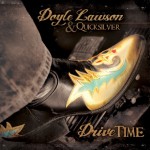 Lawson’s current Drive Time album (Mountain Home Records) is getting a lot of attention in the bluegrass world and beyond. His current line-up, as strong as memorable Quicksilver combinations in the past that included folks like Russell Moore or Jamie Dailey, features Josh Swift (the Jimi Hendrix of the Dobro?), phenomenally talented young instrumentalists Jason Barie on fiddle and Jessie Baker on banjo, songwriter/powerhouse vocalist/guitarist Mike Rogers—who has a touch of Haggard in his vocals when the band leans in a trad country direction, Carl White (with the Kewpie Doll moussed hair and comedy) on drums , and bass player Corey Hensley, who is bringing audiences to their feet every night with his heart-shaking, high, soulful voice. (Where does Doyle keep finding these guys?!)
Lawson’s current Drive Time album (Mountain Home Records) is getting a lot of attention in the bluegrass world and beyond. His current line-up, as strong as memorable Quicksilver combinations in the past that included folks like Russell Moore or Jamie Dailey, features Josh Swift (the Jimi Hendrix of the Dobro?), phenomenally talented young instrumentalists Jason Barie on fiddle and Jessie Baker on banjo, songwriter/powerhouse vocalist/guitarist Mike Rogers—who has a touch of Haggard in his vocals when the band leans in a trad country direction, Carl White (with the Kewpie Doll moussed hair and comedy) on drums , and bass player Corey Hensley, who is bringing audiences to their feet every night with his heart-shaking, high, soulful voice. (Where does Doyle keep finding these guys?!)
Rather than detract from the bluegrass core of the band, the electric bass Hensley plays and the tasteful percussion provided by White just adds a stronger foundation on the bottom end of the band’s sound. Bluegrass bands have been adding percussion to recordings for years. Doyle is just capable of doing it live, now.
“I had a fellow talk to me about the fact that I started carrying a drummer. He asked me if I would mind not doing that for his show. I said, ‘Hey, this is your day. You tell me what you want, and I’ll do my best to bring what you want.’ He said, ‘Well, I saw what happened to country music when they did all this crossover music,’ and I said, ‘Let me stop you right there. I’m not looking to cross over. What I am doing is to try to get over there and reach some of those people and try to bring them over [to bluegrass] and see what we have to offer to them. You can do that if you have something that they can relate to. Then you bring them over here and introduce them to the more modern stuff, and then right back on to the more traditional stuff—because they’re looking for something. If they’re unhappy with [the music they’re hearing on the radio], then get their attention and bring them over here. It ain’t about crossing over. It’s getting them to cross over.”
Country Store, a song Lawson and the band did last night that appears on the new record, could have been a Zac Brown hit. Their version of Love on Arrival, a country hit from Dan Seals a few years ago, is another strong single, presented in a way that would probably make both Seals and Monroe smile. We haven’t gotten into how sharply Doyle and the Quicksilver band are dressed these days—in elegant black suits with a sprinkling of rhinestones on the bandleader’s coat, and coordinated jewel-toned shirts and ties for the sidemen—but it’s likely Big Mon would have approved of that, too.
Like Monroe, every once in a while onstage Doyle Lawson is so overcome with the joy of playing bluegrass music, that his colorfully patterned cowboy boots trace a little backstep dance. After experiencing the show last night, it’s easy to understand what makes Doyle dance these days. In fact the entire audience was on their feet applauding, shouting and demanding encores, throughout the performances by all three bands. It was a good night for bluegrass mandolins, high lonesome singing, and Bill Monroe stories.

